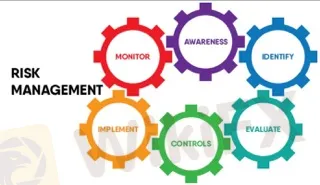简体中文
繁體中文
English
Pусский
日本語
ภาษาไทย
Tiếng Việt
Bahasa Indonesia
Español
हिन्दी
Filippiiniläinen
Français
Deutsch
Português
Türkçe
한국어
العربية
WikiFX report: RISK MANAGEMENT: The Secret Tool for Maximum Profit.
Abstract:Forex risk management allows you to put in place a system of rules and controls to ensure that any unfavorable consequences of a forex trade are contained.

Forex risk management enables you to implement a set of rules and measures to ensure any negative impact of a forex trade is manageable. Given the era in which that essay was published, it was probably viewed as merely a safe approach to the market for a limited period due to the level of uncertainty at the time, rather than as a single issue that is most instrumental for a successful trading career.
That it to say, we expect it would be a good idea to revisit the subject, shed some more light on it, and expand on a few additional tactics to help you improve your risk management skills so you can be a very successful forex trader.
First Let's look at the meaning of risk management
WHAT IS RISK MANAGEMENT?
Forex risk management is a process of identifying, assessing, and controlling the threats that arise from foreign exchange speculation.
Risk management refers to the processes that are put into place when trading to help keep losses under control and keep a good risk/reward ratio.
Risk management can help prevent a trader from losing all their money on the account. Risk management should be applied by both beginners and experienced traders (Flowbank, 2020).
The first understanding to have about forex trading is that it is quite risky.
Note: Just because something is risky doesn't mean it's terrible or should be avoided. To varying degrees, every business contains aspects of risk.
LEVELS OF RISK TOLERANCE
It is very critical to determine your risk tolerance as a trader. And the different levels of risk tolerance are as follows;
• Aggressive Risk Tolerance
• Moderate Risk Tolerance
• Conservative Risk Tolerance
None of the above options are superior to the others in any way. Your age, personality, financial situation, and discretionary income are the factors that define your risk tolerance.
In the previous article, we discussed the following strategies to aid Risk Management;
• Position Size Management
• Strategic Stop Loss and Take Profit Orders Management
• Risk/Reward Ratio Management
• Time Management in Trading
SOME MORE RISK MANAGEMENT TECHNIQUES
• Cutting your coat according to your size: This refers to appropriately sizing your trades in following the account's available capital. Oversizing is the most common reason why the accounts of most traders tank, and more often than not, capsize their trading careers. As a result, this is one of the most important principles in risk management.
• Plan your trade: It is highly reckless to enter into just any and every trade without a proper trading plan. You must know that there would always be a plethora of trading opportunities that appear profitable in the market, and you dont have to enter them all to be profitable in the long run. It's advisable not to participate in an opportunity if it doesn't fit your trading strategy. Try to avoid taking many uncorrelated trades at the same time.
• Consider sticking to the 1% rule: It's crucial to remember that, as profitable as Forex trading is, the greatest traders don't strive to make all of their money in a single trading day. The goal of trading is to achieve sustained profitability rather than to be a one-time wonder who earns a lot of money and then loses it all in a short time. According to this rule, a trader should only risk 1-2 percent of his or her trading capital on each trade entry. By taking smaller risks, you will not blow your account up with one or two losing trades.
Disclaimer:
The views in this article only represent the author's personal views, and do not constitute investment advice on this platform. This platform does not guarantee the accuracy, completeness and timeliness of the information in the article, and will not be liable for any loss caused by the use of or reliance on the information in the article.
Read more

Why More People Are Trading Online Today?
Discover why online trading is booming with tech, AI, and a push for financial freedom. From stocks to crypto, it’s a thrilling hustle for all.

Interactive Brokers Expands Crypto Trading with Solana, XRP, Cardano, and Dogecoin
Interactive Brokers adds Solana, XRP, Cardano, and Dogecoin to its platform, enabling U.S. and U.K. clients to trade crypto 24/7 with low fees.

Fidelity Investments Explores Stablecoin Innovation in Digital Assets Sector
Fidelity Investments tests a stablecoin, joining major financial firms in the booming crypto sector. Discover how this impacts digital payments and blockchain adoption.

Hantec Markets Launches InsightPro: AI-Powered Real-Time Trading Signal Tool for Traders
Hantec Markets introduces InsightPro, an AI-powered trading tool offering real-time market insights, signals, and analysis for better trading success.
WikiFX Broker
Latest News
Why Are Financial Firms Adopting Stablecoins to Enhance Services and Stability?
Experienced Forex Traders Usually Do This Before Making a Lot of Money
Octa vs XM:Face-Off: A Detailed Comparison
When High Returns Go Wrong: How a Finance Manager Lost RM364,000
Bridging Trust, Exploring Best—WikiEXPO Hong Kong 2025 Wraps Up Spectacularly
Fidelity Investments Explores Stablecoin Innovation in Digital Assets Sector
Interactive Brokers Expands Crypto Trading with Solana, XRP, Cardano, and Dogecoin
SEC Ends Crypto.com Probe, No Action Taken by Regulator
Why More People Are Trading Online Today?
Broker Comparison: FXTM vs XM
Currency Calculator







